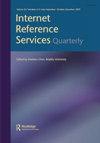Knowledge, Skills and Competencies of the Library Information Science School’s Graduates on Digital Scholarship in South Africa
Q3 Social Sciences
引用次数: 1
Abstract
Abstract The Fourth Industrial Revolution (4IR) has presented a paradigm shift in a paradigm in the field of Library and Information Science (LIS). The profession necessitates digital scholarship knowledge, skills, and competencies. Academic and special research council libraries have introduced numerous functions and activities related to digital scholarship, to accommodate the demands of the 4IR. Thus, librarians who practice in these types of libraries and others are called on to revisit their related knowledge, skills and competencies. Most librarians who have been trained by LIS schools received their qualifications before the advent of the digital scholarship activities which now form part of their profession. This has created some uncertainty as far as digital scholarship job requirements are concerned. This paper forms part of a doctoral study that aimed to explore the education and training of South Africa’s LIS professionals in digital scholarship, specifically those now serving in academic and special research council libraries. The study adopted an interpretive paradigm using a qualitative approach. A multiple case study design was used, employing semi-structured interviews as data-collection tool to interview ten digital scholarship librarians and their directors from six libraries in South Africa. The researcher sought to determine to what extent digital knowledge, skills and competences, and digital scholarship units and activities were part of their job requirements. The study concluded that LIS digital scholarship librarians should acquire digital scholarship knowledge, skills and competencies through formal education, training courses, workshops and on-the-job training. LIS schools should develop short learning courses to assist librarians in gaining the relevant knowledge, skills and competencies, while parent organizations should establish the relevant infrastructure and provide funding for training.南非图书馆信息学院数字奖学金毕业生的知识、技能和能力
第四次工业革命(4IR)带来了图书馆情报学(LIS)领域范式的转变。这个行业需要数字学术知识、技能和能力。学术和特别研究理事会图书馆引入了许多与数字学术相关的功能和活动,以适应第四次工业革命的需求。因此,在这些类型的图书馆和其他地方工作的图书馆员被要求重新审视他们的相关知识、技能和能力。大多数在美国学校接受过培训的图书馆员在数字奖学金活动出现之前就获得了资格证书,而数字奖学金活动现在已成为他们职业的一部分。就数字奖学金的工作要求而言,这造成了一些不确定性。本文是一项博士研究的一部分,该研究旨在探索南非LIS专业人员在数字奖学金方面的教育和培训,特别是那些目前在学术和特殊研究理事会图书馆服务的专业人员。本研究采用定性分析的解释范式。采用多案例研究设计,采用半结构化访谈作为数据收集工具,采访了来自南非六家图书馆的十位数字奖学金图书馆员及其主管。研究人员试图确定数字知识、技能和能力以及数字奖学金单位和活动在多大程度上是他们工作要求的一部分。该研究的结论是,美国数字奖学金图书馆员应该通过正规教育、培训课程、研讨会和在职培训获得数字奖学金知识、技能和能力。美国学校应开设短期学习课程,帮助图书馆员获得相关知识、技能和能力,而家长组织应建立相关基础设施,并为培训提供资金。
本文章由计算机程序翻译,如有差异,请以英文原文为准。
求助全文
约1分钟内获得全文
求助全文
来源期刊

Internet Reference Services Quarterly
Social Sciences-Library and Information Sciences
CiteScore
2.40
自引率
0.00%
发文量
13
期刊介绍:
Internet Reference Services Quarterly tackles the tough job of keeping librarians up to date with the latest developments in Internet referencing and librarianship. This peer-reviewed quarterly journal is designed to function as a comprehensive information source librarians can turn to and count on for keeping up-to-date on emerging technological innovations, while emphasizing theoretical, research, and practical applications of Internet-related information services, sources, and resources. Librarians from any size or type of library in any discipline get the knowledge needed on how to best improve service through one of the most powerful reference tools available on the Internet.
 求助内容:
求助内容: 应助结果提醒方式:
应助结果提醒方式:


